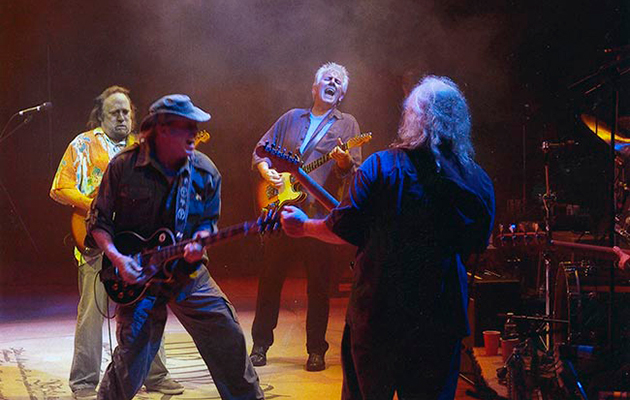“As musicians, our role is largely to entertain you,” David Crosby adds. “And make you boogie. But there’s also the troubadour part, the town crier part. ‘It’s 11.30 and all’s well,’ or, ‘It’s 12 o’clock and there’s a chimpanzee loose in the White House and things aren’t so damn good.’ That’s part of our job. But, let me tell you, if we hadn’t liked those songs, we wouldn’t have played them. But those things need to be said, and we were proud to say ’em.”
Stephen Stills, whose cocaine-fuelled megalomania had done so much to destructively contribute to the squandered promise of CSNY, was perhaps typically, even after all these years, reluctant to immediately commit himself.
“I had to work with Stephen a little bit,” Young admits. “He knew there’d be a political impact, and at first he didn’t want to do it. He does not like negativity. He says often, ‘I don’t want anybody throwing anything at me.’ He’s easily hurt. He’s easily damaged by people saying bad things about him. I understand that, I understand that he’s sensitive, so I tried to defuse that coming right at him, because we’re brothers. He gets hurt by this. It’s a funny thing. The same thing that makes him sensitive is what makes him a great guitar player and has given him the ability to write some great songs.”
“Neil was very careful to note my misgivings or ambivalence about the whole deal,” Stills recalls for Uncut. “Because there was a part of me that was saying, ‘This is so over the top, we’re just going to galvanise the Republican base.’
Because at the last election, there was a lot of antipathy about the big concerts [The Rock The Vote tour, featuring Bruce Springsteen, REM, Pearl Jam and more]. And, of course, some of the songs, in Bush country, I was expecting the boos and catcalls from that wonderful 20 per cent of America that just, you know, they’re always there… They’ll always be that way and there’s no convincing ’em of anything. And some family members wanted to come to the concert and by the end of it, they were giving Neil the finger.”
“It was easy to do these songs with Crosby, Stills, Nash and Young,” Neil concludes. “There was a link [to our past], you could feel it. I didn’t think about it when I started doing it. That was kind of an epiphany that just happened, and then we kept going in that direction. Quite often, there’s no plan. You just keep alive, you keep your eyes open, and everything reveals itself. You pick some berries and you leave some behind.”
So would it be safe to say that after nigh-on four decades of continuous acrimony, failed reunions and competitive ego-wars, that CSNY have at last achieved a mutual equity? A communal sense of shared purpose?
Not quite, according to an aside from Crosby in the movie. Asked to explain the current power structure in this famously fractious group, he replies: “CSNY is not a democracy. It’s a dictatorship. But it’s a benevolent dictatorship. Neil,” he says, “is in charge”.
Uncut then asks Neil Young if, for this tour at least, he was prepared more than usual to play the diplomat. “Not necessarily,” he laughs. “I think I was more of a warlord.”
___________________
“WE BLEW IT…”
CSNY: Déjà Vu opens with a Rock’n’Roll Years-style montage of history and music that places Crosby, Stills, Nash and Young in a pantheon of protest singers alongside Phil Ochs and Bob Dylan. The historical parallel is obvious: yesterday’s Vietnam is today’s Iraq, and the Freedom Of Speech tour is an attempt to inject some of CSNY’s countercultural DNA into the troubled politics of the Bush era.
The link between then and now is Woodstock, the August 1969 festival that remains a high point of the idealism of the hippy movement, or the beginning of its end, depending on who is holding the slide-rule. For CSNY, whose performance that day catapulted them into the rock stratosphere, the festival seems to have included both possibilities.
Perhaps more than anyone at the festival, CSNY’s fortunes were transformed by their appearance at Woodstock. There were incendiary displays from The Who and Sly Stone, and Jimi Hendrix’s violent deconstruction of the “Star Spangled Banner” remains an unsurpassed moment of musical protest, but something about CSNY’s performance endeared them to the mass audience who went to see Michael Wadleigh’s Woodstock documentary.
“What was so cool about them was that they represented community,” Wadleigh says. “Rarely has rock’n’roll had harmonies like that from four guys that sing and play so beautifully and are folky. It would have been great if one of them had been a woman or a transvestite. Too bad that they’re all males, too bad that they’re all white. At least we had one Brit. But here were these four long-haired guys who seemed to have such camaraderie: the four musketeers. And their songs were fantastic for the time.”



